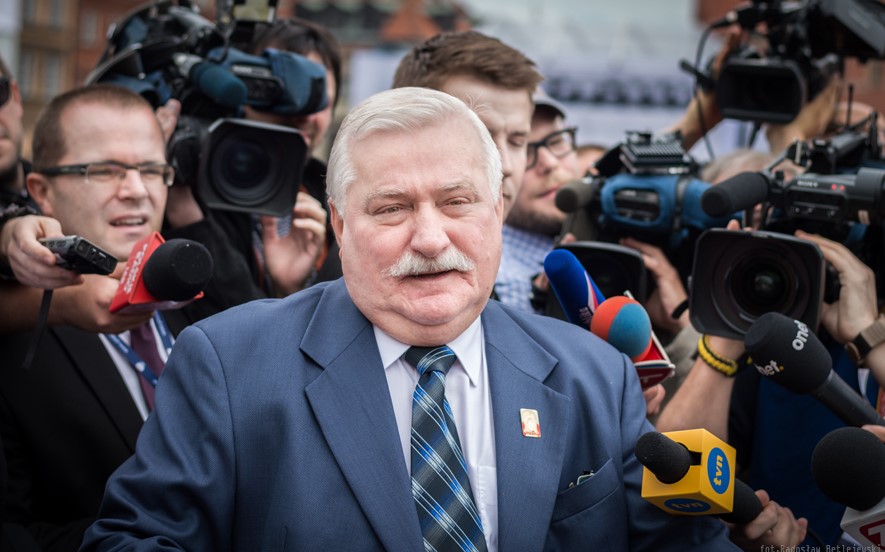The Lech Wałęsa Institute has threatened to sue Poland’s education minister, Dariusz Piontkowski, for saying that schools should teach that Wałęsa was a communist agent as well as being leader of the Solidarity movement that helped bring down the communist regime.
There have been longstanding claims that Wałęsa – who won the 1983 Nobel Peace Prize for his role in opposing the communist regime – had in the 1970s been a paid informant of the security services. These were bolstered in recent years by the emergence of documents purported to contain his signature.
Wałęsa has always rejected the accusations, suggesting that the alleged evidence is falsified and part of an effort to discredit him. He has in recent years been a vocal critic of the current ruling party, which has promoted the idea that he was a collaborator.
As Poland this week marked the 40th anniversary of the founding of Solidarity – the first independent trade union in the Soviet bloc – Piontkowski was asked how Polish schools should teach about Wałęsa’s role.
“Lech Wałęsa is a figure clearly associated with Solidarity,” the education minister told RMF FM. “Nobody is going to erase that. He is a figure that went down in history.”
The interviewer then pressed on whether classes should focus on the fact that Wałęsa “was an agent, or rather that he was one of the founders and the face of Solidarity”. Piontkowski responded that teachers “should speak about both”.
In response to the interview, Adam Domiński – the head of the Lech Wałęsa Institute, an NGO set up by the former Solidarity leader in 1995 – condemned Piontkowski’s “shameful statement” that sought to “change history” on “the ruling party’s orders”.
He urged the education minister to withdraw his remarks and apologise. If not, the institute would take “all possible legal steps to make the minister bear legal responsibility for violating Lech Wałęsa’s personal rights and attempting to mislead the young generation”, reports RMF24.
Piontkowski, however, refused to back down. In a statement, he said that “the teaching of history in schools must be based on historical truth, regardless of whether it is convenient for the people it concerns”.
He noted that Wałęsa’s collaboration with the communist security services in the 1970s has been documented by historians from the Institute of National Remembrance (IPN), a state body charged with researching and prosecuting Nazi and communist crimes.
Piontkowski’s remarks echo those of other government figures in recent years. In 2017, the culture minister, Piotr Gliński, said he hoped that Wałęsa would always be presented in museums and textbooks as “Bolek”, his code-name when allegedly acting as a communist informant.
“We cannot distort history,” Gliński told Rzeczpospolita. Wałęsa was “a cog in the machine that crushed millions”. He has subsequently “damaged Poland” with his “falsifications and denials”.
In the same year, the then defence minister, Antoni Macierewicz – who like Gliński was a Solidarity activist in the 1980s – called Wałęsa “one of the most dangerous and harmful agents of the security services” who has now become a “symbol of betrayal”.
This week, another prominent former Solidarity activist, Władysław Frasyniuk, came to Wałęsa’s defence. Responding to the education minister’s comments, Frasyniuk told TVN24 that only “cowards dare to speak of Wałęsa as an agent”.
“People with complexes” about the fact that they did not play a prominent role in the history of Solidarity now seek to remove Wałęsa from it, said Frasyniuk, who like Wałęsa is an outspoken critic of the current government.
In 2017, after further evidence suggesting that Wałęsa had been a paid communist informant emerged, a poll by IBRiS for Rzeczpospolita found that 62% of Poles still regarded him as a national hero and 68% said that the new disclosures did not influence their perception of him.
An earlier survey, conducted by CBOS in 2010, asked Poles who the greatest figure associated with Solidarity was. Almost half (47%) picked Wałęsa, ahead of Jacek Kuroń (20%) in second and Tadeusz Mazowiecki (10%) in third.
Yet as Poland marked Solidarity’s 40th anniversary this week, Wałęsa featured very little in government commemorations.
During a speech by the prime minister, Mateusz Morawiecki, a number of leading Solidarity figures were mentioned but Wałęsa was not. Wałęsa himself attended a separate ceremony in Gdańsk with Frasyniuk and opposition politicians.
Meanwhile, the Solidarity trade union published an animated video – created in collaboration with the culture ministry – to mark the anniversary. An image of Wałęsa appears briefly but, unlike other leading opponents of the communist regime, he is not mentioned by name.
Solidarity has in recent years become closely associated with PiS. They worked together, with the support of the church, to introduce a Sunday trading ban. Solidarity has also backed the government’s anti-LGBT campaign and recently endorsed PiS’s candidate, Andrzej Duda, to be re-elected as president.
Main image credit: Radek Bet/Flickr (under CC BY-NC 2.0)

Daniel Tilles is editor-in-chief of Notes from Poland. He has written on Polish affairs for a wide range of publications, including Foreign Policy, POLITICO Europe, EUobserver and Dziennik Gazeta Prawna.




















